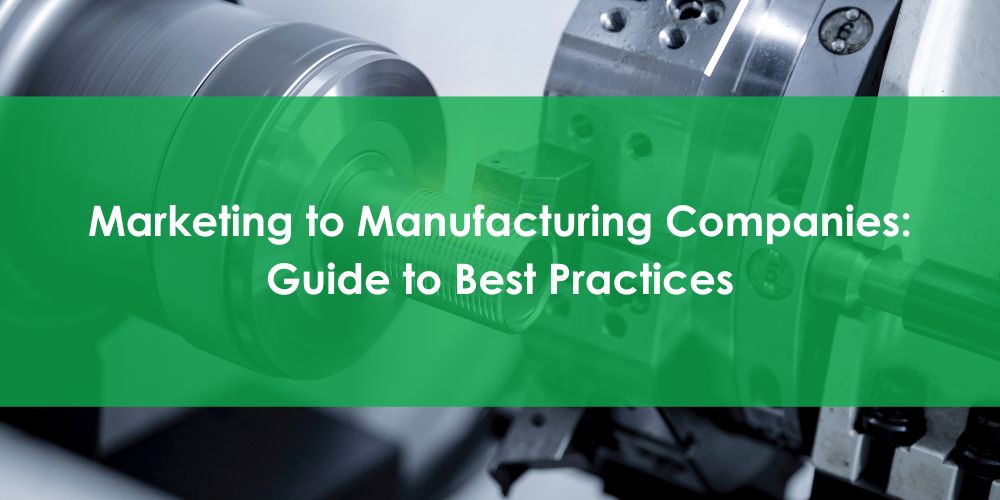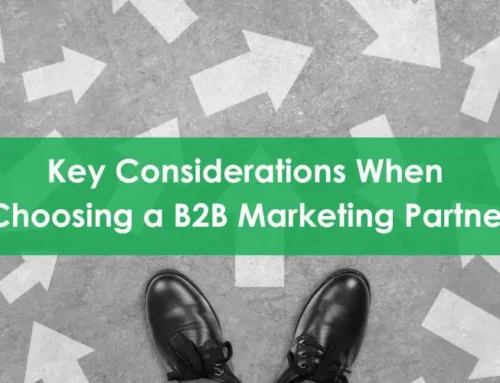Marketing to Manufacturing Companies: Guide to Best Practices | ZAG FIRST
The digital age has dramatically reshaped the way businesses market [...]

Table of Contents
The digital age has dramatically reshaped the way businesses market their services, especially in the manufacturing sector. When it comes to marketing for manufacturing companies, the traditional blanket strategies won’t cut it. The manufacturing sector is unique, and understanding its nuances is crucial for any effective marketing campaign that wants to sell to manufacturers.
The Cornerstone of Success of Marketing to Manufacturers: Setting Goals and KPIs
If you want to market to the manufacturing industry, it’s paramount to lay a strong foundation. Clear objectives guide the direction of your marketing efforts. By setting realistic goals (such as lead generation for manufacturing companies) and establishing relevant Key Performance Indicators (KPIs), you pave the way for a marketing campaign that’s not just strategic, but also measurable. Remember, what can be measured can be improved.
Understanding the Nuances of Marketing to Manufacturing
Marketing to manufacturing companies is not just another B2B endeavor. It requires a keen understanding of the sector’s unique characteristics, challenges, and opportunities. Here are some key nuances to consider:
a. Decision-Making Layers:
Unlike some industries where decisions can be made swiftly, manufacturers often have multiple layers of decision-makers. From procurement teams to CEOs, your marketing approach should cater to various stakeholders, each with their own priorities and concerns.
b. Long Sales Cycles:
The manufacturing industry often involves lengthy sales cycles. Patience is key, as is consistent and value-driven follow-up. Your marketing strategies should focus not just on lead generation, but also lead nurturing.
c. Technical Complexity:
Manufacturers are often dealing with intricate processes and machinery. Marketing materials that show a deep understanding, or even simplification, of these complexities can build trust. This means that content should be both informative and accessible.
d. Relationship-Driven Deals:
While digital marketing is crucial, personal relationships still hold significant weight in the manufacturing sector. Face-to-face meetings, industry events, and factory visits can complement your online strategies.
e. Industry Evolution:
The manufacturing landscape is rapidly changing with advancements in technology, automation, and global supply chain dynamics. Staying updated on these shifts and demonstrating this awareness in your marketing can position you as a forward-thinking partner.
Understanding these nuances is fundamental. To resonate with manufacturing companies, marketers must go beyond generic B2B strategies and tailor their approach to address the specific challenges and opportunities inherent in the manufacturing world.
Why Traditional Marketing Tactics Fall Short
Manufacturers have shifted from traditional mediums to digital platforms for their information and sourcing needs. Generic advertisements and cold calls are less effective. Today’s manufacturers are looking for partners who can provide value and understand their specific challenges.
Digital Marketing Essentials for Targeting Manufacturers
a. Website Optimization:
In today’s digital age, your website is often the first impression you make. Ensure it’s user-friendly, mobile-optimized, and offers valuable content. Implement SEO strategies specific to the manufacturing audience to boost your visibility on search engines.
b. Content Marketing and SEO for Manufacturers:
For businesses targeting the manufacturing sector, a nuanced approach to content marketing, anchored by SEO, is vital. Begin with in-depth keyword research to identify terms and queries relevant to manufacturing professionals. Prioritize organic search visibility on platforms like Google by crafting high-quality, insightful content optimized with these keywords. Ensuring on-page SEO elements such as meta titles, descriptions, and clean URL structures are in place is equally important. Additionally, regularly monitor and adjust your strategies using analytics tools to keep your content relevant and easily discoverable by your target audience.
c. Paid Search and Google Ads:
In the competitive digital landscape, Paid Search and Google Ads serve as potent tools to swiftly position your offerings in front of manufacturing professionals. While organic strategies build long-term visibility, Google Ads provides immediate visibility, driving targeted traffic to your website or landing pages. By meticulously selecting and bidding on industry-specific keywords, you can ensure that your ads appear when manufacturing decision-makers are actively searching for solutions. It’s crucial to craft compelling ad copy paired with optimized landing pages to maximize conversions. Regularly monitoring ad performance, adjusting bids, and refining ad creatives ensures that you get the best return on investment and remain aligned with the evolving needs of your target audience.
d. LinkedIn Marketing for Manufacturers:
LinkedIn stands out as the premier B2B platform, especially when targeting manufacturing professionals. Beyond just a networking tool, LinkedIn offers an ecosystem where businesses can establish authority, share industry insights, and directly engage with decision-makers. Regular content publication, from articles to infographics, can position your brand as a thought leader in the manufacturing space. Sponsored posts and LinkedIn Ads allow for targeted reach, ensuring your content resonates with the exact manufacturing demographics you aim to connect with. Moreover, by actively participating in relevant groups and discussions, and fostering genuine connections, businesses can build lasting relationships, amplifying their credibility and influence in the sector.
e. Email Marketing and Lead Nurturing:
In the world of B2B marketing, especially when targeting manufacturers, email remains a powerful and direct line of communication. Beyond just sending out newsletters or promotional content, email marketing allows for segmented and personalized campaigns tailored to the unique interests and challenges of different manufacturing professionals. With advanced automation tools, businesses can set up intricate lead nurturing sequences, ensuring that potential clients receive timely, relevant information that guides them through the decision-making process. Crafting engaging email content, coupled with clear calls-to-action, can drive conversions, strengthen brand recall, and foster deeper relationships, making it an indispensable tool in a holistic marketing strategy to the manufacturing sector.
Leveraging Data and Analytics in Marketing to Manufacturers
In the intricate realm of marketing to manufacturers, data and analytics emerge as indispensable navigational tools. As the manufacturing sector is characterized by its technical complexity and multilayered decision-making processes, having actionable insights is paramount. By employing advanced analytical tools, marketers can gain a deep understanding of how their content is resonating, which platforms are driving the most engagement, and where potential leads are in the sales funnel. Such insights allow for real-time adjustments, ensuring that campaigns remain relevant and effective. For instance, by analyzing click-through rates on email campaigns or conversion rates on landing pages, businesses can pinpoint what resonates most with manufacturing professionals and refine their strategies accordingly. Additionally, predictive analytics can provide foresight into emerging trends, enabling businesses to stay one step ahead in addressing the needs and concerns of manufacturers. In essence, data-driven decision-making ensures that marketing strategies are not based on mere intuition but are rooted in tangible metrics, driving both efficiency and efficacy in reaching out to the manufacturing audience.
Next Steps for Marketing to Manufacturing Companies
In the dynamic landscape of marketing to manufacturing companies, the blend of modern digital strategies with a deep industry understanding sets businesses apart. By tailoring your approach, leveraging data-driven insights, and maintaining a pulse on industry trends, you’re not just marketing—you’re forging meaningful partnerships. For expert guidance, tailored strategies, and a partnership that truly understands the intricacies of the manufacturing world, don’t hesitate to reach out to zagfirst.com. Let’s navigate this complex landscape together.




